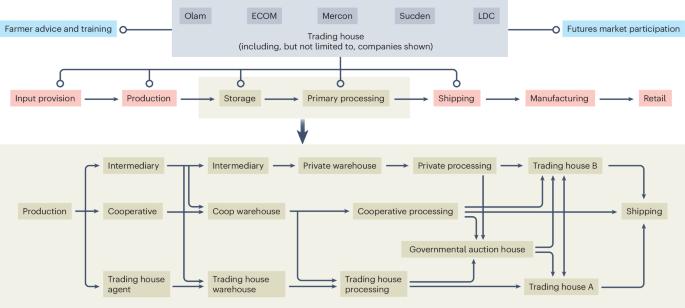The role of midstream actors in advancing the sustainability of agri-food supply chains
IF 25.7
1区 环境科学与生态学
Q1 ENVIRONMENTAL SCIENCES
引用次数: 0
Abstract
Global food supply chains remain critical drivers of ecosystem degradation and social injustices. In this Perspective we invite policymakers, civil society actors, businesses and researchers to direct attention to the middle of global supply chains, where various actors—referred to as ‘midstream actors’—operate between agricultural commodity producers and manufacturers of food products. We highlight the power of this less visible segment (spanning multinational trading houses to small-scale aggregators of commodities) and the potential leverage that can be harnessed to improve supply chain and food system sustainability. Not engaging these actors poses a risk to the impact of supply chain policy. Global food supply chains drive ecosystem degradation and social injustices. This Perspective focuses on the ability of midstream actors operating between agricultural commodity producers and manufacturers of food products to improve supply chain sustainability.

中游参与者在促进农业食品供应链可持续性方面的作用
全球食品供应链仍然是生态系统退化和社会不公的关键驱动因素。在本《视角》中,我们邀请政策制定者、公民社会行动者、企业和研究人员关注全球供应链的中间环节,即农产品生产者和食品制造商之间的各种行动者(称为 "中游行动者")。我们强调这一不那么显眼的环节(从跨国贸易公司到小规模商品聚合商)的力量,以及可用于改善供应链和粮食系统可持续性的潜在杠杆作用。没有这些参与者的参与,供应链政策的影响就会面临风险。全球食品供应链导致生态系统退化和社会不公。本视角关注在农产品生产商和食品制造商之间运作的中游参与者改善供应链可持续性的能力。
本文章由计算机程序翻译,如有差异,请以英文原文为准。
求助全文
约1分钟内获得全文
求助全文
来源期刊

Nature Sustainability
Energy-Renewable Energy, Sustainability and the Environment
CiteScore
41.90
自引率
1.10%
发文量
159
期刊介绍:
Nature Sustainability aims to facilitate cross-disciplinary dialogues and bring together research fields that contribute to understanding how we organize our lives in a finite world and the impacts of our actions.
Nature Sustainability will not only publish fundamental research but also significant investigations into policies and solutions for ensuring human well-being now and in the future.Its ultimate goal is to address the greatest challenges of our time.
 求助内容:
求助内容: 应助结果提醒方式:
应助结果提醒方式:


